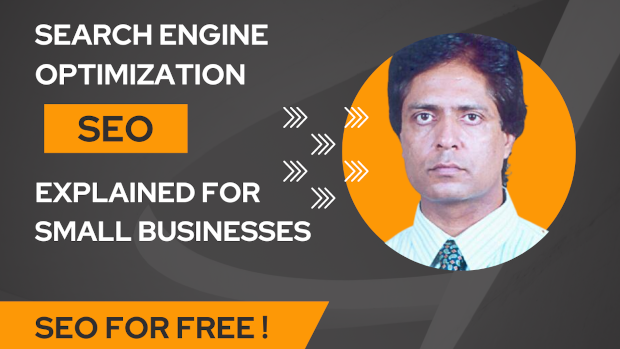Search Engine Optimization SEO Explained for Small Businesses

Search Engine Optimization SEO Explained for Small Businesses. What is SEO and how does it work? What is SEO in simple terms? How do beginners do SEO?
By Rakesh Raman
Search Engine Optimization SEO Explained for Small Businesses
What is SEO and how does it work?
What is SEO in simple terms?
How do beginners do SEO?
What is the main purpose of SEO?
How should businesses use SEO?
Search engine? Huh. After thinking and thinking, I could define a search engine like this: A search engine is a Web illusion that searches everything for you except what you want to search.
In other words, even after years of its introduction, search technology is still so crude that you can’t rely on it.
You can see that most results that you get for your search query are totally irrelevant and they uselessly flow on reams of Web pages – making search engine a veritable smorgasbord of confusing information snippets.
Then how do you expect Search Engine Optimization (SEO) to work properly? In fact, SEO is supposed to make your Web pages search-engine friendly so that they get higher visibility free of charge in search results.
But the way ad agencies and SEO agencies sell their services based on usual tricks and false commitments amounts to hoodwinking the buyers. And many customer companies have burnt their fingers, as they did not get any meaningful results after hiring SEO services. Probably, your company is one of them.
If there is something called SEO, it’s just a factor of content. If the content or information on your Website or Web pages is not original and fresh, no amount of SEO tricks can help you bring your pages at top in search engines like Google, Yahoo, or Bing.
Today, there are an estimated one trillion Web pages that reside on nearly one billion Websites. When you enter your search words on a search engine – say, Google that is the most widely used search facility – it culls out results that match your search words from this ocean-like Web. And it displays those results on multiple pages.
Normally, Google displays just 10 search results per page. If you are not able to find what you wanted to search on the first page, you have to click the next page, and so on. A user usually starts huffing at the second page, is fed up at the third page, and is not willing to go to fourth while there may be hundreds of pages that Google would display for a single query.
Even on the first two pages of search results, research shows that Web readers follow a Golden Triangle rule. That means, they will read the full line of the result that appears at the top and then fewer words in the second result, and so on.
At the last result of the page, they would hardly read even the first word at the line. So, from the first to the 10th result on the search page, it forms a triangle – left to right, top to bottom. If your Web page reference does not appear in this triangle, your SEO thing has gone futile.
Then how do you expect your Web page to appear in the first one or two pages of search results? And what are SEO agencies doing? Why do they charge you for SEO services?
There are two types of search queries: head queries and long-tail queries. Head queries are the generic keywords that people use like “film makers” in an area. And long-tail queries are specific terms like the exact name of your company or a particular product.
Most SEO agencies cheat you by showing the tail query results when they give the exact search string that exists exclusively in your site. For example, “yourname CEO of your company name.” With this kind of query, your company name is likely to appear somewhere at the top in search results.
But that doesn’t meet your requirement of doing SEO. Most Web users try it with head keywords. For example, if you are a furniture manufacturer, buyers who want to buy furniture will enter “furniture manufacturers” along with the area where they live.
There will be thousands of Web pages of furniture manufacturers that the search engine will extract. But it displays only 10 results per page. Then how will your page appear in the first one or two pages? It won’t unless your site is full of meaningful content and many of its pages are indexed in the search engine.
Truth is that almost all smaller companies have static Websites with just a few pages. New content is rarely added on these sites. In fact, these are the companies that SEO agencies target and fleece. For want of knowledge, they easily fall prey to the tricks of cheating SEO service providers.
As companies need to protect themselves from these frauds and save their money being spent on SEO, they should avoid paying to any SEO agency. The first step for such companies is to build content-heavy company sites with useful information for their target users like buyers.
Content work is difficult, expensive, and very expensive. It can take a few months to a few years depending on your budgets to create the right content for a corporate Website. Most ad agencies and SEO agencies are not trained enough to handle content work. While there are specialized content service providers, they are not easily available.
Once your corporate and product site has sufficiently useful content, you can do SEO without the help of an external agency. These days, free SEO plug-ins are available for all popular content management systems like WordPress. You can easily download and configure these small software tools for your site and start using them. It’s easy.
When you add a new post or article in your site, the SEO plug-in allows you to enter focus keywords for which you want that particular page to be found by others. It even suggests you options that you can use as keywords.
The same plug-in prompts you to add the SEO title that can be different from the headline of your page. So you can have a catchy headline along with a SEO title that carries all your important keywords about that page. It can even generate the title for you. The plug-in also tells you that your title should not exceed 70 characters because search engines usually look at the first 70 characters.
Moreover, the SEO plug-in asks you to add the meta description for that page. Although meta description won’t directly help you push your page up on a search engine, it can encourage users to click on the hyperlinked search result if the description that you write is attractive enough.
The use of SEO plug-ins is very simple for site administrators or the people who update information on your site. Then why should you pay to external agencies for SEO services? Never hire these services.
If you want to pay, you must pay to content developers because any SEO activity including the SEO plug-ins will work only if your site content is in order.
Content and only content can help you attract buyers and other business partners to your site. Only content can help you expand your business through the Web channels.
Without having attractive and plentiful content on your site, even God won’t help you leverage search engines for your marketing needs. Remember, God helps those who believe in the magnetic power of content.
By Rakesh Raman, who is a national award-winning journalist and founder of the humanitarian organization RMN Foundation. Earlier, he was writing an exclusive edit-page tech business column (named Technophile) regularly for The Financial Express (a daily business newspaper of The Indian Express Group). He had also been associated with the United Nations (UN) through the United Nations Industrial Development Organization (UNIDO) as a digital media expert to help businesses use technology for brand marketing and business development.













